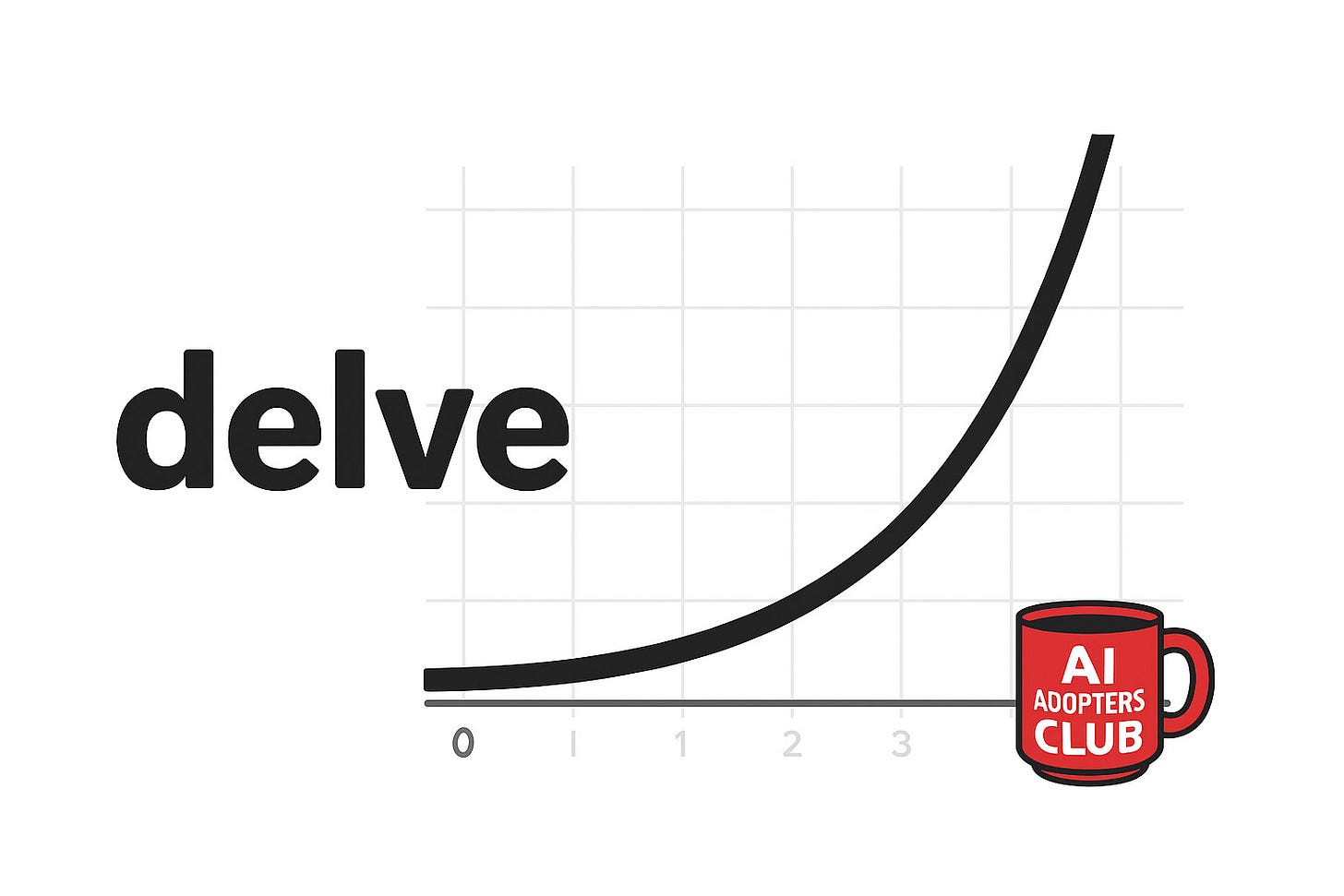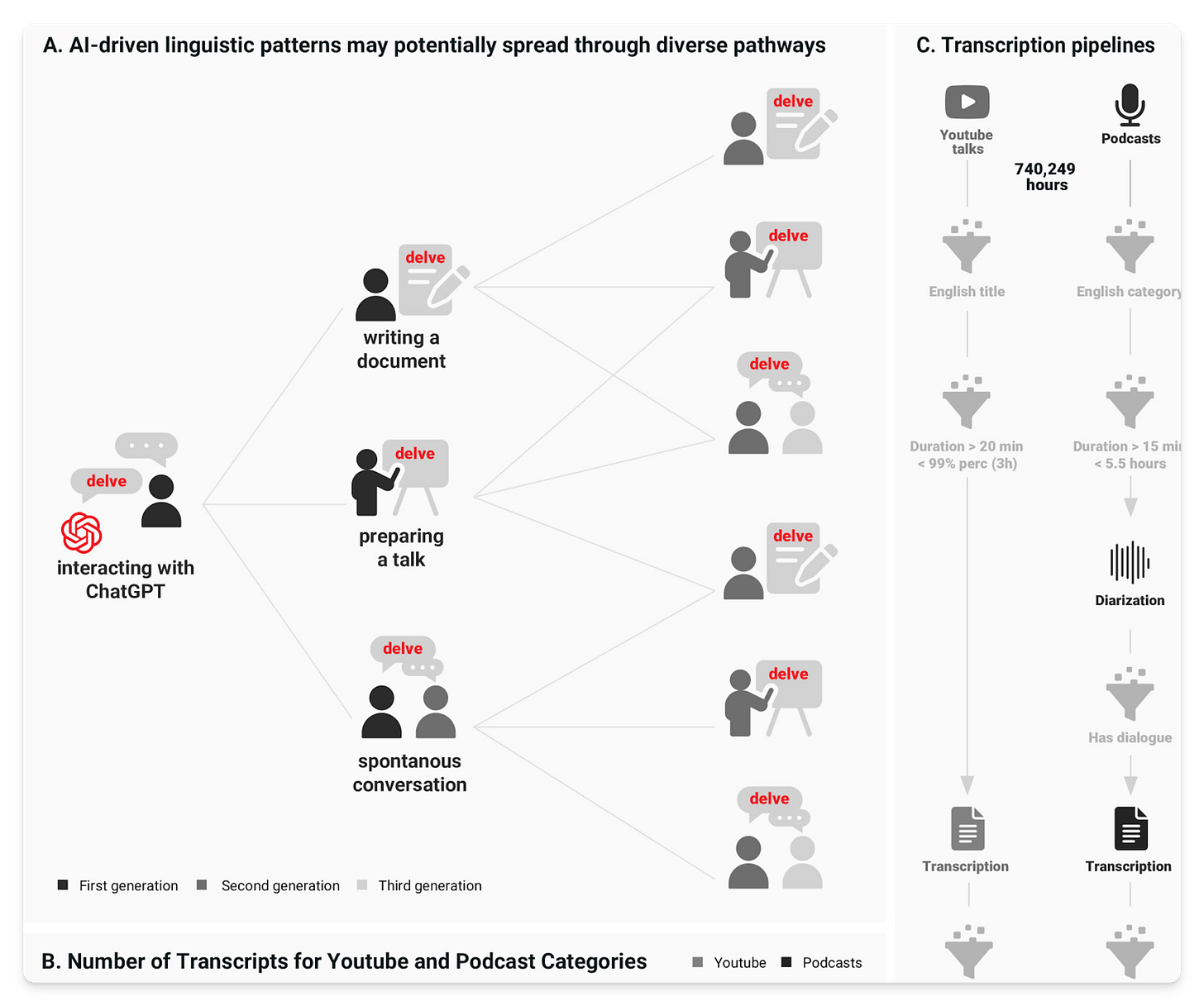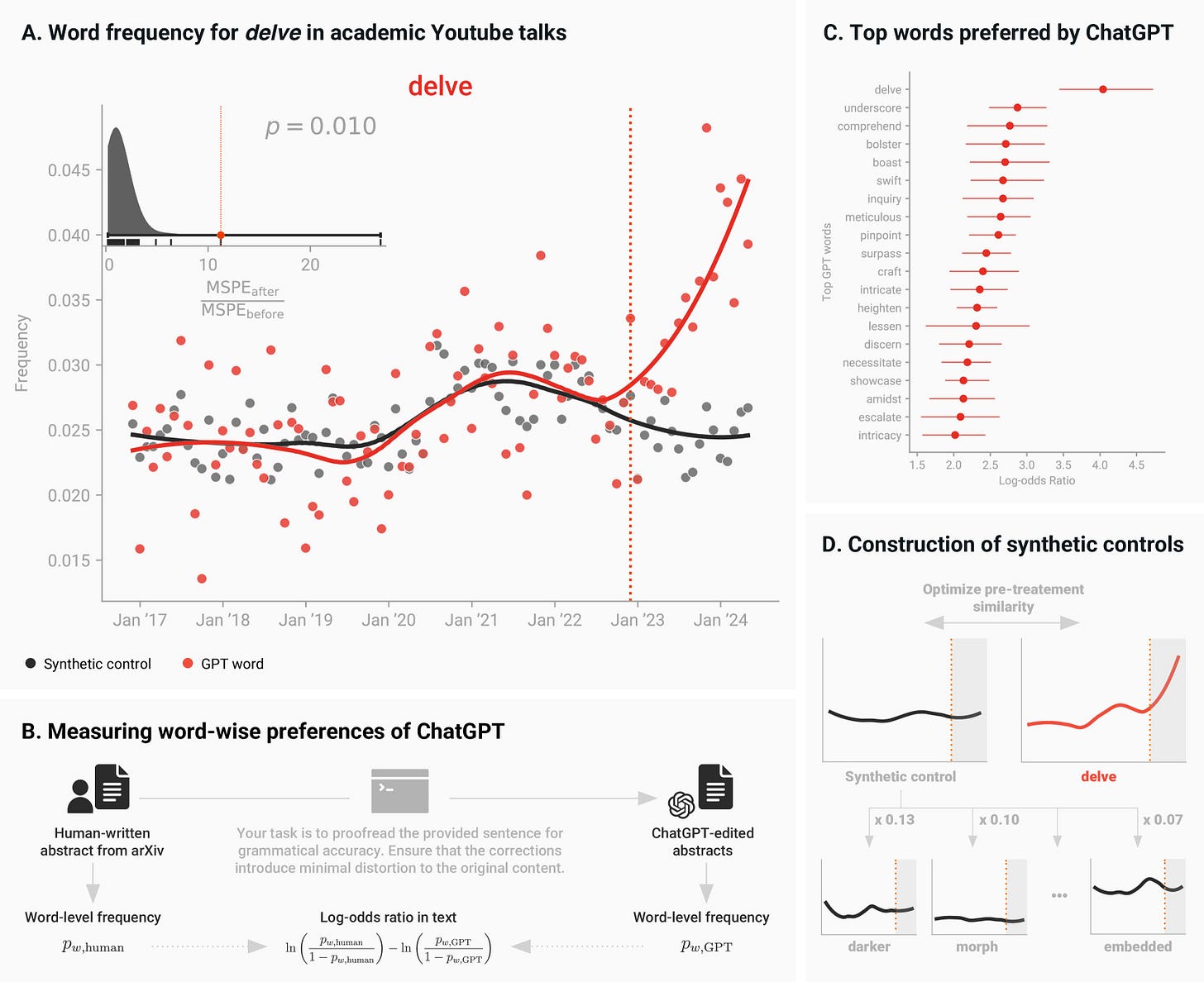Your Coworkers Are Talking like ChatGPT and You Don't Even Know It
New research proves AI is reshaping human speech in real time (are you affected?)
Hey Adopter,
I'm absolutely delighted to delve into this comprehensive analysis that will undoubtedly enhance your understanding of how we can leverage cutting-edge insights to optimize our strategic approach to communication patterns—while simultaneously facilitating a transformative paradigm shift in the dynamic landscape of linguistic evolution. This meticulous examination will surely bolster your ability to navigate the intricate tapestry of cultural confluence—ultimately empowering you to harness robust methodologies that underscore the pivotal synergies within today's holistic business environment.
Just kidding. That's exactly what ChatGPT would write. And according to new research, that's exactly how your coworkers are starting to talk.
Your team started saying "delve" more often after November 2022. So did everyone else.
A massive study analyzed 740,000 hours of human speech from YouTube talks and podcasts. Researchers found a sharp jump in ChatGPT's favorite words like delve, comprehend, boast, swift, and meticulous after its release
The researchers tracked how AI language spreads to humans using massive datasets: 360,445 YouTube academic talks and 771,591 podcast episodes. They transcribed over 7 billion words to catch the shift. They started with academic videos since previous studies already proved that ChatGPT was changing academic writing. For podcasts, they only used actual conversations to see if the influence reaches spontaneous speech.
This isn't people reading ChatGPT scripts. These are spontaneous conversations. Real human-to-human dialogue where ChatGPT's word choices are creeping into how we naturally talk.
The implications go way beyond word choice.
The feedback loop nobody saw coming
Here's what makes this scary. Machines learned from human data, developed their own quirks, then taught those quirks back to us. We've built a closed loop where AI learns from us, picks up habits, then changes how we speak.
ChatGPT has clear preferences. It loves formal, polite language. It picks "delve" over "explore" or "examine." ChatGPT consistently chooses safe, corporate-friendly communication. Politeness, neutrality, conflict avoidance. The stuff HR departments dream about.
Your conversations are getting more corporate. More sanitized. More predictable.
The study tracked this across different fields. Science and tech adopted ChatGPT language first. Business and education followed. Even casual podcast conversations show the shift.
To measure ChatGPT's word preferences, researchers fed human-written texts into ChatGPT and compared the before and after versions. Words that showed up way more often in ChatGPT's edits got higher "GPT scores." Delve scored highest across all ChatGPT versions. To prove causation, they built synthetic controls using words with similar usage patterns before ChatGPT's release, then tracked what happened after.
What this means for your workplace
Stop and think about your last team meeting. How many people used words they wouldn't have picked two years ago? How often did someone "delve into" a topic instead of just looking at it?
This matters because language shapes thinking. When we all talk the same way, we think the same way. Language drives human thinking, and now it powers machine intelligence too.
Your brainstorming sessions get less creative. Your problem-solving becomes cookie-cutter. Your team's unique voice gets replaced by corporate AI speak.
Companies already fight groupthink. Now we're layering AI-influenced groupthink on top.
The business risk hiding in plain sight
AI systems favor specific traits, so they speed up the death of cultural diversity. Your company's edge often comes from thinking differently. When everyone adopts the same AI-influenced speech patterns, that edge vanishes.
Worse, this builds on itself. Future AI models train on data packed with previous AI outputs. The feedback loop gets stronger. The flattening speeds up.
Your team's distinctive voice becomes history. Your company's unique culture turns into generic corporate speak.
How to protect your team's voice
First, pay attention. Notice when someone uses weirdly formal language in casual conversation. Call out the shift toward AI-influenced talk. Make it conscious instead of automatic.
Second, save your team's real communication patterns. Document how your best people actually talk when they're solving problems. Capture the informal language that drives breakthrough thinking.
Third, build AI guidelines that protect voice. When your team uses ChatGPT for writing, make them translate outputs back into how your company actually speaks.
The researchers found something encouraging. Not every ChatGPT word catches on with humans. We're not just passive sponges for AI influence. We still choose.
Use that choice before you lose it.
Here's a prompt that forces ChatGPT to sound more human, based on the research findings:
Write this in natural, conversational language. Follow these rules strictly:
BANNED WORDS - Never use these AI favorites: delve, comprehensive, leverage, optimize, enhance, facilitate, utilize, implement, strategic, dynamic, robust, innovative, transformative, paradigm, synergy, holistic, meticulous, bolster, underscore, pinpoint, groundbreak, confluence, pivotal, nuanced, intricate, tapestry, landscape, evolving, context, insight, perspective, framework, facet, intricacies, iterative, underpinning, spectrum, trajectory, testament, foundations.
SIMPLE REPLACEMENTS - Use these instead: look at (not delve), understand (not comprehend), fast (not swift), careful (not meticulous), support (not bolster), question (not inquiry), find (not pinpoint), improve (not enhance), use (not utilize), plan (not strategic), strong (not robust).
TONE REQUIREMENTS - Write like you're explaining this to a smart colleague over coffee, not presenting to a board room. Be direct and assertive. Skip hedge words like "possibly," "potentially," "seemingly," "relatively," "fairly," "essentially," "basically."
STRUCTURE RULES - Use varied sentence lengths. Mix short punchy sentences with longer explanatory ones. Use contractions. Start with impact, not setup. Skip generic openings like "Imagine if" or "What if." Avoid transition clichés like "In fact," "Indeed," "Clearly," "As a result." Never use em dashes, use commas or periods instead.
VOICE GUIDELINES - Sound like a real person, not a content generator. Be conversational but avoid corporate buzzwords. Focus on substance over style. Make bold statements without unnecessary softening language.The researchers found one encouraging detail. Not every ChatGPT-preferred word gets adopted by humans. We're not passive recipients of AI influence. We still have a choice.
Use it before you lose it.
Adapt & Create,
Kamil






I posted on LinkedIn about the dead giveaways that something was written by AI. Some people said, ‘I always talk like that…’, which is evidence to the feedback loop. And also, some people REALLY LOVE em dashes